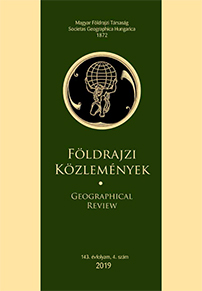Geographers after Graduation – Results of an Online Survey
Abstract
The number of MSc and BSc geography students has been constantly decreasing in Hungarian universities over the past 8–10 years. This negative trend fits into a general decline in student numbers in Hungary since 2005. Therefore, our aim was to conduct a nationwide survey among Geography MSc and BSc graduates, in order to reveal employment opportunities, as well as their perceptions on the value of the knowledge and competences gained at the university. The online questionnaire was developed and launched by the representatives of all Hungarian higher education institutions involved in geography training, resulting in a sample size of 589 respondents. The survey confirmed that the jobs and occupations of graduates show an extraordinarily heterogeneous picture; only the domains of regional planning and education represent a substantial share, whereas a significant proportion of jobs are only loosely related to geography. Theoretical knowledge obtained at the university is predominantly utilised by the graduates remaining in the academic sphere and by those working in the field of education. Roughly half of the respondents are occupied in the private sector; they mainly benefit from practical and professional skills such as (geo)informatics, mapping, field experiences, report-making, and teamwork. Accordingly, for those who are not willing to become teachers or researchers, further strengthening of these skills seems to be a fundamental task in Geography as a discipline of higher education. In addition, reforming ‘training and outcome requirements’ (KKK) in a way to make curricula more flexible and, where appropriate, to enable tailor-made specialisation should be important aspects of the planned improvement of education as well.
Copyright (c) 2020 Tamás Telbisz, Márton Berki, Gábor Tóth, Tibor Lenner, Gábor Kovács, Erika Bácskainé Pristyák, László Sütő, Erika Homoki, György Kajati, Beáta Siskáné Szilasi, Gábor Pirisi, Szabolcs Fábián, György Sipos

This work is licensed under a Creative Commons Attribution-NonCommercial-NoDerivatives 4.0 International License.



